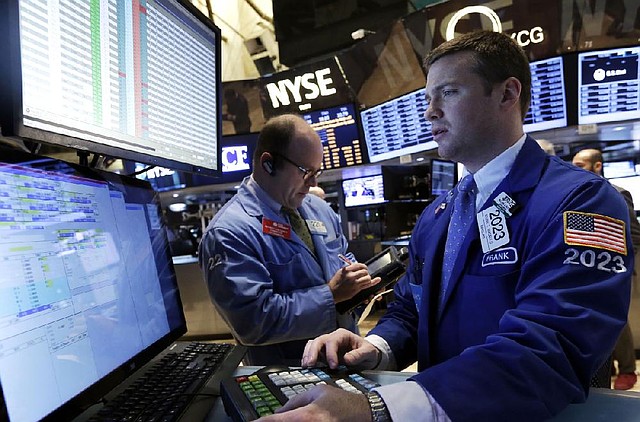Stock dip no surprise to investors
Wednesday, December 4, 2013
NEW YORK - Stocks fell Tuesday, dragged lower by the Detroit automakers and consumer-focused companies such as GameStop and Amazon.com. The market stands to face its first weekly decline since early October.
The Dow Jones industrial average fell 94.15 points, or 0.6 percent, to 15,914.62. The Standard & Poor’s 500 index fell 5.75 points, or 0.3 percent, to 1,795.15, and the Nasdaq composite fell 8.06 points, or 0.2 percent, to 4,037.20.
The declines do not come as a surprise to investors, many of whom have been predicting a pullback. The S&P 500 has surged 26 percent this year, on track for its best year since the dot-com bull market of the late 1990s.
“When you look at how markets have performed this year, some investors may have decided to cash in, put their feet up and drink eggnog,” said Lawrence Creatura, a portfolio manager with Federated Investors.
Stocks cannot go straight up all the time. For stocks to pause, decline or even enter a “correction,” a Wall Street term for when an index falls 10 percent or more, would all be considered normal after eight straight weeks of gains.
“The markets may have stalled out here, but that must be taken in the context of what has been a great year,” said Alec Young, global-equity strategist with S&P Capital IQ.
Companies that depend heavily on consumer spending had some of the biggest losses. GameStop, the video game retailer, sank $1.02, or 2 percent, to $45.95, one of the worst declines in the S&P 500. Amazon.com fell $7.64, or 2 percent, to $384.66.
Automakers also fell. General Motors lost 97 cents, or 3 percent, to $38.14, and Ford fell 50 cents, or 3 percent, to $16.56, despite what auto industry analysts considered mostly positive sales reports for November.
Investors are waiting for several economic reports later this week that could influence whether the Federal Reserve will pare its $85 billion-a-month bond-buying program, which is designed to keep interest rates low and stimulate the economy.
On Friday, the government will release its monthly job-market survey, one of the most closely watched indicators of the U.S. economy. Economists expect that employers created 180,000 jobs last month while the unemployment rate remained steady at 7.2 percent, according to FactSet, a financial information provider.
Investors have been seeing some encouraging economic news recently. A trade group reported Monday that manufacturing was growing in the U.S. at the fastest pace in 2½ years. The group also said factories were hiring at the quickest rate in 18 months.
A strong economy is good for corporate profits, and by extension the stock market, over the long term. But if the economy is getting closer to full strength, that means the Fed could have more reason to pull back its stimulus program, which has been supporting financial markets. The Fed’s bond-buying program has been giving investors an incentive to buy stocks by making bonds look more expensive in comparison.
“The concern in the near term is that, since the economic data is picking up steam, the Fed could pull back as soon as January,” Young said.
On Thursday, investors will have other important economic news to consider, as they receive an updated report on U.S. economic growth. Economists expect the economy expanded at a 3.2 percent annual rate last quarter.
Business, Pages 26 on 12/04/2013
